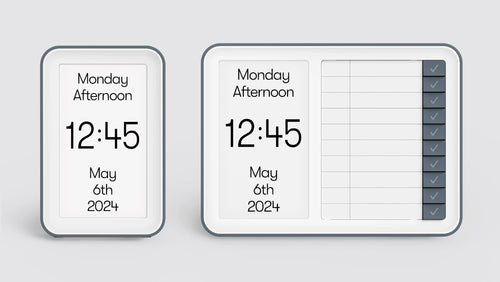When it comes to living with dementia, some individuals prefer to remain in their homes throughout. This allows them to maintain their routine, have a deep understanding of their surroundings, avoid the major destruction of moving to a new location and have familiarity. Family members often want to be able to support their loved ones to live at home for as long as possible.
In this article, we will discuss various options for caring for someone with dementia at home, provide practical tips for caregivers, and discuss when it may be necessary to consider residential care. We understand the challenges faced by caregivers and individuals living with dementia, and we aim to provide you with information and solutions that can help you navigate this journey with confidence and compassion.
What are your options for dementia care at home?
When it comes to dementia care at home, there are several types of care available depending on the needs and stage of the person living with dementia. Here are the most common options that you may wish to consider for your loved one with dementia.
Option 1: Family Care
Family care is the idea that care for the person living with dementia comes from one or more family members within the family unit.
A family member or members will take on a range of caregiving responsibilities, from assisting with daily activities to managing medications and providing emotional support.
If several people are helping with care, try matching the caregiving needed to a person in the family with an interest or perhaps experience in the area. For example, if someone is a nurse or pharmacist in the family, they would be brilliant at helping with medication.
Advantages of family care
- It can be a wonderful way to maintain a sense of familiarity and continuity for the person with dementia.
- They get to interact with people they trust and have an established familiarity with.
- It’s an opportunity to strengthen the bond between the caregiver and the person with dementia.
- It can be a rewarding experience for both the caregiver and loved one with dementia.
Drawbacks of family care
- Physical and emotional demands placed on family members may be challenging.
- It can be draining, especially for family members who have a very close emotional bond with the person living with dementia.
- Families doing this should have a support plan in place for themselves involving self-care practices so they do not burn out.
- It can be difficult to juggle caring for a loved one with dementia around other commitments such as childcare or work.
Option 2: Home Care
Visiting care involves having a professional caregiver visit the home at arranged times to provide assistance and support. This person can support with personal care, emotional support, meal preparation, or medication management.
Advantages of home care
- A professional caregiver can tailor care to the specific needs of the person with dementia.
- The person with dementia can remain in the comfort of their own home while receiving the necessary support.
- Provides respite for family caregivers, allowing them to take breaks and attend to their own needs.
- Families can focus on providing emotional support rather than day-to-day tasks.
Drawbacks of home care
- This type of care can be very costly if it is not covered by a local authority or existing healthcare plan.
- Some family members may feel distanced from the care given to their loved one.
- It may not always be possible for the same carer to visit your loved one due to staff rotas.
Some families opt for a split of both, between family care and visiting care, to help balance time and money considerations.
Option 3: Live-in Care
Live-in care is when a dementia care professional moves in with the person with dementia, to provide round-the-clock support and supervision. The support that a live-in caregiver provides is immense, as they can assist with personal care, mobility, medication administration and household tasks. This option is ideal for individuals living with more advanced dementia or those who require continuous care and monitoring.
Advantages of live-in care
- Safety concerns are eliminated as a loved one will always have someone there to support them.
- A loved one will never be alone and may find companionship comforting.
- Provides peace of mind and a sense of security for both the person with dementia and their family members, as there is someone present at all times to offer assistance and ensure their wellbeing.
- A trained professional will be able to administer specialist care for people in the later stages of dementia.
- A loved one with dementia will be able to stay in the comfortable and familiar surroundings of their home.
Drawbacks of live-in care
- It is an expensive option that will not be open to the majority of families.
- Additional space, such as a spare room, will be required for the live-in carer.
- Your loved one may not be comfortable sharing their home with a stranger.
How to care for someone with dementia at home
Caring for someone with dementia at home requires careful consideration. Here are some essential considerations for home caregivers.
Practical Matters
When caring for someone with dementia at home, you must take into account practical aspects such as driving, employment, finances, and power of attorney. It's essential to address these matters early on to ensure the person with dementia's affairs are managed effectively and their wishes are respected.
Future Planning
Discuss future care options, such as making a will and considering long-term care arrangements. While it may be difficult to think about these decisions, early planning can provide peace of mind for both the person with dementia and their loved ones.
Environmental Factors
A safe and accessible home environment must be considered. Some things to consider include installing grab bars, removing all tripping hazards, and considering assistive devices such as Relish’s dementia clock with Task Alerts, Day Hub. Making the home dementia-friendly can significantly reduce the risk of accidents and promote independence.
Emotional Considerations
Help the person living with dementia stay connected and maintain relationships with others, and engage in activities and hobbies that they enjoy. Encourage social interactions, maintain relationships, and explore dementia-friendly activities and support groups in the community.
Health Considerations
The person living with dementia’s eating, drinking, exercising, and sleeping habits should be monitored. It is important that they maintain a nutritious diet, remain hydrated, engage in gentle physical activity, and have a regular sleep routine. Medication management is also crucial, so establish a system to help them take their medications as prescribed and assist with scheduling appointments.
The use of dementia aids, apps, and gadgets designed specifically for people with dementia, such as Relish's Day Hub dementia reminder clock, can be revolutionary for maintaining routine and engaging in normal habits.
The Day Hub not only helps individuals with keeping orientation by displaying the time, date, and whether it’s morning, afternoon or night, but also gives reminders for important tasks, like taking medication or eating a meal, providing reassurance to both the person with dementia and their caregivers.
Seeking support as a caregiver for a loved one with dementia
You know the timeless saying: you cannot pour from an empty cup? This is true when it comes to caring for someone living with dementia. As much as it can be rewarding to be involved, it can be tiring and emotionally draining.
You cannot truly care for anyone else if you are not caring for yourself first. It's important to remember that you're not alone in this journey. Here are some ways you can seek support:
- Carers Allowances and Benefits: Look into whether you are eligible for any financial assistance or benefits as a caregiver. These resources can provide some financial relief and support your caregiving role.
- Support Groups: Most communities have either local or online support groups for caregivers of individuals with dementia. Connecting with others who share similar lived experiences can provide wonderful emotional support, valuable insights and practical advice.
- Respite Care: Be sure to take advantage of respite care services that provide temporary relief. This is an important chance to rest, recharge, or attend to personal matters, knowing that your loved one is receiving professional care in your brief absence.
- Community Resources: It takes a village. Explore community resources and organisations specialising in dementia care, like your local library. There are often educational programs, counselling services, and additional support tailored to the needs of caregivers and individuals with dementia.
Explore our resources for family caregivers of people living with dementia.
When should a person with dementia go into a care home?
This decision is certainly tricky and involves a wide range of considerations. For these decisions, it's vital for loved ones to step back and try to assess the needs of the person living with dementia from a non-emotional perspective. Try to see it from a practical perspective. Deciding when someone should transition to a care home is a deeply personal and complex decision.
Be sure to consider the following things:
- Safety and wellbeing: Assess whether the person's needs can be adequately met at home. If their safety or wellbeing is at risk due to the progression of dementia or the inability to manage daily activities, a care home with specialised dementia care may be a safer and more practical option.
- Caregiver Capacity: Evaluate the physical, emotional and even financial toll that caregiving is having on the family caregivers. If the demands of caregiving become overwhelming, it may be time to consider residential care to ensure both the caregivers and the person with dementia's wellbeing.
- Medical Needs: Consult healthcare professionals to examine the person's medical requirements. If their care needs exceed what can be provided at home, residential care may offer access to specialised medical services and a higher level of support.
It's important to approach this decision from a sensitive and mindful approach and always try to involve the person with dementia and other family members in the discussion. Each situation is personal and unique, so seeking guidance from healthcare professionals and exploring different care options can help you make an informed decision.
Relish’s Day Hub Can Give Home Caregivers Peace of Mind
Caring for someone with dementia at home is a journey that requires understanding, patience, and support. Alongside the various care options available, innovative solutions like Relish's Day Hub dementia reminder clock can provide invaluable assistance by helping individuals with dementia stay oriented and reminded of everyday tasks.
The Day Hub's features include displaying the time and date and providing activity reminders, which can offer peace of mind for both caregivers and individuals living with dementia. Remember, with the right support, people with dementia can continue to enjoy a good quality of life while living in the familiar surroundings of their own homes.
















